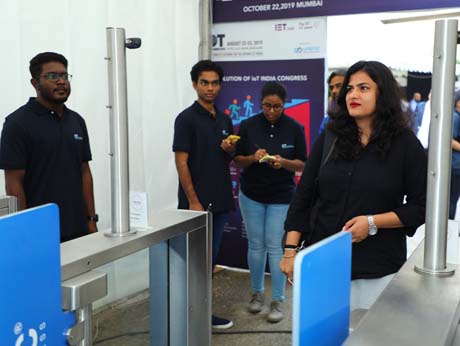
Bangalore, September 7 2019: The recently concluded fourth edition of India’s largest conclave on Internet of Things, the IoT India Congress 2019, at the Lalit Ashok hotel in the city saw the first use in India, of facial recognition technology for admitting delegates and visitors to the venue.
While registering for the event for free online, prior to the Congress, delegates were encouraged to provided basic details like name, email, phone number and organisation, as well as uploading a passport-type photograph of their face.
At the event, such pre registered delegates were directed to a row of special wing gates each equipped with a shoulder-height camera which scanned the visitor's face and after matching it with a pre-registered face within seconds, opened the wing gates. There was no paper work of any kind to gain access -- dramatically reducing the queues normally to be seen at the registration desks of such conventions.
The facial recognition -based entry barriers were supplied by the Chennai-based India subsidiary of a German company which specialises in access gates and barriers -- Magnetic Access. The company with headquarters in in Schopfheim in the southern Black Forest region of Germany, is part of the FAAC Group since 2012, with subsidiaries in USA, Australia, Malaysia, India and Brazil. The India operation has its manufacturing plant in Pondicherry and supplies a variety of vehicle and pedestrian barriers used in car parks, toll stations, airports, industrial units etc. While such gates have been widely operated by swipe cards, finger print scans and numeric passwords, this is the first instance where entry has been regulated by the still evolving technology of facial recognition
At the IoT Congress in Bangalore, the organisers, , the India office of The Institution of Engineering and Technology (IET)-- deployed the face recognition-backed barriers at three locations -- at the main entrance to the event, at the entry to the technical sessions and at the food hall at lunch time. The set ups functioned without any glitch and may encourage other trade fairs and conventions to adopt this cutting edge technology to avoid the traditional crowding that is a common feature at the entry controls of large events in India.